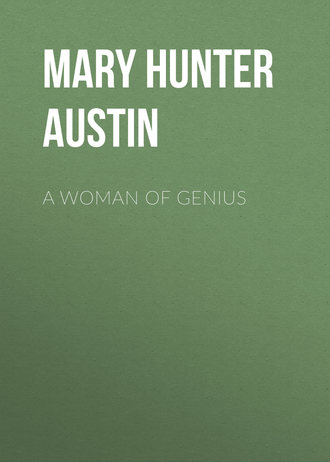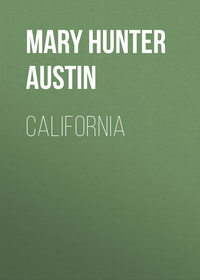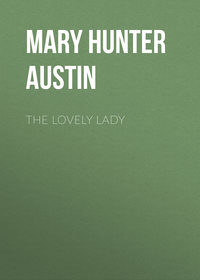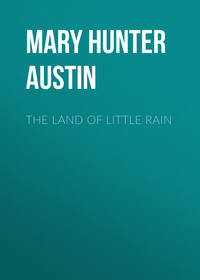 полная версия
полная версияA Woman of Genius
"The real trouble with you," Jerry told me, "is that you are trying to live in Chicago and Taylorville at the same time."
Not being able to make any headway with him, I went to call on Miss Filette. I wasn't on terms with her that would admit of an assault on her confidence, I didn't know her well enough to call on her in any case, but I wasn't to be thwarted of good intention by anything so small as a breech of manners in doing it. It wasn't so much the offense of my undertaking it that counted, I found, as Miss Filette's determination not to hear anything that would ruffle the surface of her complacency. I had to drop plumb into my revelation out of the opportunity she made for me in the question, as to whether the play would or would not go on the road before Christmas.
"I should hope so," I dropped squarely on her; "Jerry's wife needs him. There's a child coming in April."
"Yes," said Miss Filette; she was giving me tea and she poised the second lump over my cup with an inquiring eyebrow. "Have you seen what we have done with the second act lately?"
"Anyway," I said to myself as I went, "she knows. She can't skid over the facts as she has my telling her."
But it was the certainty that, knowing, she kept right on with Jerry, that drove me back on Pauline and Henry Mills. I fled to them to be saved from what, in the only other society I had access to, fretted all my finer instincts; to be ricocheted by them again on to that reef of moral squalour upon which the artist and woman in me were riven asunder.
What I should have done was to take my courage in my hands and have gone on from Taylorville to New York. But the most I was equal to was a fixed determination to accept anything which would take me nearer Broadway, which, even then, was to the player world all that the lamp is to the moth. In the meantime I had settled in two housekeeping rooms in a street that I wouldn't have dared to give to a manager as an address; one of those neighbourhoods where there are always a great many perambulators, and waste paper blowing about. There was never anything for me, in the frame of life called Bohemian, more than a picturesque way of begging the question of poverty. What I looked for in a lodging, was escape from the bedraggled professionalism which went on in what were called studios, by means of a cot bed, an oil stove, and a few yards of art muslin. That I hadn't managed it so successfully as I hoped, was made plain to me a few days after I had moved in, by the discovery of a card tacked on the opposite door, that read, "Leon Griffin, the Varieté." It was the same theatre at which Cecelia Brune was playing the chief attraction in song and dance. In the glimpses I had of Mr. Griffin in the dark hall going in and out, I was aware that he gave much the same impression of unprofitable use that was associated in my mind with the Shamrocks.
All this time I kept going through the motions of looking for an engagement. Now and then some shining bubble of opportunity seemed to float toward me, to dissolve in thin air as soon as I put my hand out to it. One of these brought me to Cline and Erskine's waiting room on the day that Cecelia Brune elected to register her complaint against what she considered a slight of her turn at the Varieté. She flounced about more than a little, not to let the rest of us escape the inference that she was not used to being kept waiting. When she had hooked and unhooked her handsome furs for the fourth time, she introduced me to Leon Griffin, who except for the name, I shouldn't have recognized for my hall neighbour. It was like being slapped in the face with my own hard condition to have him crowded on me in that character before the whole roomful. Life seemed so to have beggared him. In broad day he looked the sort of a man who has failed to sustain himself in the man's world, and must reinforce his value with the favour of women. Little touches of effeminacy about his dress failed to take the attention away from its shabbiness. His hair had the traditional thespian curl in spite of being cropped short, to allow of various make-ups, one surmised, and his very blue eyes were in a perpetual state of extenuating the meagreness of his other features. Being ashamed of my shame at meeting him there, I began to be very nice to him. Cecelia, in spite of her magnificent raiment, perhaps on account of it, had been disposed to graciousness. She drew us together with a wave of her hand.
"She ought to be doin' Ophelia on Broadway," she introduced me handsomely; "wouldn't that get you!"
"I saw you with the Hardings last year," Griffin assented, almost as though I might think it a liberty. "Where are you playing now?" He had the stamp of too many reverses on his face not to estimate mine at its proper worth. He had fine instincts too, for as soon as I told him that I was out of an engagement that season, he put himself on record quite simply. "My turn goes off next week – I'm trying to get Cline to put it on the circuit." When we came out of the office together he fell into step with me. One of the young women ahead of us made the shape of a bubble with her hands and blew it from her. "Pouff" she said. "There goes another of my chances." She laughed with a fine courage.
"They all go through with it," Griffin affirmed. "There's Eversley – " I have forgotten which of the well-known incidents he related.
"Eversley told me I might come to it. What made you think of him?" I demanded.
"I saw his name in the paper; he's to play here this winter. He's a wonder."
"He said wonderful things to me once." I had just recalled them.
"They'll come true then. Eversley never makes a mistake. Why, I remember once – " He broke off as though he had changed his mind about telling me. I was wondering if I couldn't get rid of him by stopping in at Sarah's, when he broke out again suddenly.
"To think of you being out of an engagement and a girl like Cecelia Brown – yes, I know her name is Brown, Cissy Brown of Milwaukee – "
"I've always suspected it," I admitted, "but it is her looks of course, and the clothes; Cecelia has lovely clothes."
"Well, so could you if…" He checked himself. "I don't mean to say anything against a lady…"
"I've always suspected that, too," I admitted, "but one doesn't like to say it."
"Well, you know what she gets – thirty-five a week. A girl doesn't wear diamond sunbursts on that."
"Mr. Griffin, I wish you'd tell me what sort of man it is that gives diamond sunbursts to Variety girls: I've never seen any of them."
"You have probably, but you don't know it. You meet their wives in society."
"Henry Mills." I don't know what made me say it; the image of him came tripping along the surface of my mind and slid off my tongue without having more than momentarily perched there.
"Is he in business downtown, and has he got a perfectly proper family and too many dinners under his vest?"
"Mr. Mills's home life is ideal; but I didn't mean – "
"Neither did I, but that's the type. They mostly have ideal families, but they couldn't live up to them if they didn't have Cecelia Brunes on the side… I beg your pardon."
He had looked up and caught me blushing a deep, painful red, but it wasn't on account of what he had intimated. I was blushing because of the discovery in myself of needs which, compared to the ideal of life I had set for myself, were as much of a defection as anything our conversation had suggested for Henry Mills. I was conscious in those days of a slow, steady seepage of all my forces toward desperation.
"You'll have to take a company out for yourself," was Jerry's solution. "I'll write you a play. I've got a ripping idea – a man, with a gift, and two women, good women both of them – that's where I score against the eternal triangle – each of them trying to save him from the other and breaking him between them." Jerry's plays were never anything more than dramatizations of his immediate experience. "You and Sarah Croyden, you set each other off; I'll write it for both of you." He walked up and down in my little room with his hands in his pockets and his shining black hair rising like quills.
"Jerry, how long will it take you to write that play? And how much will it cost to produce it?"
"Ten thousand dollars," he answered to the last question. "About eighteen months if I go right at it."
"And I've money enough to last me to the end of February. No," to his swift generous gesture. "You have to live eighteen months on yours – and another child coming." I made up my mind that I should have to speak to Pauline and Henry Mills.
Greater than any mystery of creative art to me, is the mystery by which the recipients of its benefits manage to keep ignorant of its essential processes. I have never been able to figure to myself how Pauline and Henry escaped knowing that the creative mood, the keen hunger of which is more importunate than any need of food or raiment, was to be had for very little more than they spent fattening their souls on its choice products. For it is always to be bought; it is the distinction of genius as against talent, always to know in what far, unlikely market the precious commodity is to be bought. How was it that Henry escaped knowing that the appealing femininity which plays so large a part in the success of an actress with an audience of Millses, is largely the result of having been the object of that solicitious protection which it is supposed to provoke? With what, since it was agreed between Pauline and me that I was not to pay down on that counter what Cecelia and Jerry parted with cheerfully, was I ultimately to pay for it? Now that I had on all sides of me the witness of desperation, I began to be irritated at the way in which, in view of our long friendship, they accepted it for me.
As the holiday season approached, without any change in my circumstances other than a steady diminution of my bank account, I came to the conclusion that the only possible move was toward New York and that I should have to ask Henry to advance me the money for it. In view of what came to me afterward it was a reasonable proposition, but I reckoned without that extraordinary blankness to the processes of art which is common to those most entertained by it.
It was a day or two after Christmas, from which I had been excused by my recent bereavement, that I went out to dinner there with the determination to bring something to pass commensurate with their usual attitude of high admiration for and confidence in my gift. We had gone into the library after dinner, at least it was a room that went by that name, though I don't know for what reason except that Henry smoked there and the furniture was upholstered in leather, as in Evanston it was indispensable that all libraries should be.
Here and there were touches that suggested that if Henry moved his income up a notch or two, Pauline's taste might not be able to keep pace with it. Henry warmed his back at the gas log and wished to know how things went with me.
"As well as I could expect them here. I've made up my mind to try for New York as soon as I can manage it."
"What's the matter with Chicago?" Henry's manner implied that whatever you believed about it, you'd have to show him.
"Well, I'd have to be capitalized to do anything here the same as in New York, and the field there is larger." I went on to explain something of what the metropolis had to offer.
"I guess the worst thing about Chicago is that you're out of a job. People don't get sore on a place where they are doing well."
"No. They generally light out for a place where there are more jobs." I thought I should get on better if I took Henry in his own key, but he forged ahead of me.
"If there's anything the matter with your acting, why don't you ask somebody?"
"There's nobody to ask. Besides, there isn't anything the matter with it; the matter is with me."
"Well, I must say I don't see the difference."
"Oh!" I cried. I hadn't realized that they wouldn't just take my word for it. "It is because I am empty – empty!" I trailed off, seeing how wide I was of his understanding. I shouldn't have questioned Henry Mills's word about the capitalization of a joint stock company; and I resented their discounting my own statement of my difficulties. Pauline got hold of my hand and patted it. I wondered if it was because all her own crises were complicated with Henry Mills that she always thought that affectionateness was part of the answer.
"It is only that, with all your Gift, Henry can't understand how you need anything else," she extenuated.
"I need food and clothes," I blurted out; "pretty soon I shall need a lodging."
"Oh, my dear!" Pauline was shocked at the indelicacy. I don't know if she didn't understand how poor I was, or if it was only the general notion of the sheltered woman, to find in complaint a kind of heresy against the institution by which they are maintained. "After all," she caught up with her accustomed moral attitude, "there's a kind of nobility in suffering for your art. It's what gives you your spiritual quality." I thought I recognized the phrase as one that was current in the women's clubs of that period. I took hold of my courage desperately.
"Well, I'm offering you a chance to suffer two thousand dollars' worth." Pauline's tact was proof even against that.
"You Comedy Child!" she laughed indulgently.
"You're getting ideas," Henry burbled on cheerfully; "all these long-hairs and high-brows you've been associating with, they've filled you up. That friend of yours, McDermott, somebody had him to the club the other day, talking about the conservation of Genius. Nothing in it. Let them work for their money the same as other people, I say."
"You know you didn't have any money to begin with," Pauline reminded me. I was made to feel it a consideration that she hadn't pressed the point that if I couldn't do again what I had done then, there was something lacking in the application. They must have taken my gesture of despair for surrender.
"I guess you were just getting it out of your system," Henry surmised comfortably.
It was not the first nor the last time that I was to come squarely up against the lay conviction that whatever might be known about the processes of art, it wasn't the artist that knew it. Later, when Henry took me out to the car, he came round to what had been back of the whole conversation.
"I suppose you could use more money in your business; most of us could," he advised me, "but you don't want to let people find it out. There's nothing turns men against a woman so much as to have her always thinking about money."
It was a very cold night as I came down the side street to my door, deserted as a country road. The narrow footpath trodden in the pavement looked like the track of desolation, the cold flare of the lamps was smothered in sodden splashes of snow. There had been the feeling of uneasiness in the air that goes before a storm all that forenoon, and in the interval that I had been revaluing a lifelong friendship in terms of what it wouldn't do for me, it had settled down to a heavy clogging snow. I was startled as I turned in at the entry to find a man behind me. He had come up unsuspected in the soft shuffle and turned in with me.
By the light that filtered through the weather-fogged transom I saw that he was Griffin of the Varieté. Now as I fumbled blindly at the latch he came close to me.
"Beg pardon!" He had put out his hand over mine and turned the key for me.
"My fingers are so cold," I apologized. I turned my face toward him with the stiffness of cold and tears upon it and there was an answering commiseration in his eyes. I reached out for the key and he took my hand in his, holding it to his breast with a movement of excluding human kindness. If the gesture was at all theatrical I did not feel it. I let him hold it there for a moment before I went in and shut the door.
CHAPTER V
Depression, as well as the storm which held on heavily all night and the next day, kept me close, and the state of my coal bin kept me in bed most of the next day. Along late in the afternoon I was aroused from a lethargy of cold and crying, by Leon Griffin tapping at the door to know how I did. The snow by this time had settled down to a blinding drift, and the thermometer had fallen into an incalculable void of cold. Griffin was in his overcoat as though he had just come in or was just going out, though I learned later he had been sitting in it all day in his room. The impression it created of his being in the act of passing, led me to open my door to him, as I otherwise might not have done. A terrible, cold blast came in with him and a clattering of the shutters on the windward wall of the house. Outside, the day was falling dusk; there was no light in the room but the square blank of the window curtained by the sliding screen of snow, and my little stove which glowed like a carbuncle in its corner.
"You're cozy here" – he put it as an excuse for lingering, for I hadn't asked him to have a chair – "you hardly feel the wind. On my side there's a trail of snow half across the room where the wind whips it in between the casings."
Though he had come ostensibly to offer me a neighbourly attention, he was plainly in need of it himself; it was his last night at the Varieté and, between the storm and the depression of having nothing to turn to, he was coming down with a cold. I had him into my one easy chair and suggested tea.
"I hardly slept any last night," he apologized over his second cup, "the shutter clacks so." I could hear it now like the stroke of desolation.
That night when I heard him stamping off the snow in the hall, I had a hot drink for him, but when I saw him, by the rakish light of the hall lamp, wringing his hands with the cold before taking it, I insisted he should come on into my still warm room. I had to turn back first to light my own lamp and, in respect to my being in my dressing gown with my hair in two braids, to slip into my bedroom and experience, as I looked back at him through the crack in the door, the kind of softening a woman has toward a man she has made comfortable. The light of my lamp, which was shaded for reading, like a miniature calcium, brought out for me the frayed edge of his overcoat and all the waste and misuse of him, the kind of faded appeal that sort of man has for a woman; forlorn as he was, as he put the bowl back on the table, I was so much more forlorn myself that I was glad to have been femininely of use to him.
Pauline wrote me to come out and stay with her during the protracted cold spell, but owing to the difficulty in delivery, the invitation failed to reach me until the severity of the weather was abated. In any case I was still too sore at what seemed to me the betrayal of my long confidence, to have been willing to have subjected myself to any reminders of it. And whatever kindness Pauline meant, it could hardly have done so much for me as Leon Griffin did by just needing me. It transpired that he had no stove in his room, and the heat from the register for which we were definitely charged in the rent, scarcely modified the edge of the cold. For the next two or three days we spent much of the time huddled over my stove. Snow ceased to fall on the second day, and nothing moved in our view except now and then the surface of it was flung up by the wind, falling again fountain-Pwise into the waste of the untrampled housetops that stretched from my window to the icy flat of the lake darkening under a dour horizon. Somehow, though I had never been willing to confess to my friends how poor I was, I made no bones of it with Griff, as I had heard Cecelia call him, a name that seemed somehow to suit the inconsequential nature of our relation better than his proper title. We frankly pooled our funds in the matter of food, which one or another of us slipped out to buy, and cooked on my stove. I took an interest in preparing it, such as I hadn't since the times when I imagined I was helping Tommy on the way to growing rich, and when the room was full of a warm savoury smell and the table pulled out from the wall to make it serve for two, we felt, for the time, restored to the graciousness of living. We fell back on the uses of domesticity, by association providing us with a sense of life going on in orderliness and stability. It came out for me in these moments that it is after all life, that Art needs rather than feeling, and that, to a woman of my capacity, was to be supplied not by innocuous intrigues like Jerry's but by the normal procedure of living. I believe I felt myself rather of a better stripe, to find it so in the domestic proceeding, though I do not really know that my necessity was any whit superior to Miss Filette's, except in offering the minimum possibility of making anybody unhappy by it. But because I knew my friends would think it ridiculous that I could lay hold of power again by so inconsiderable a handle as Leon Griffin, I suffered a corroding resentment. Griffin was getting up a new act for himself, and evenings as I helped him with it, I felt a faint stirring of creative power. When he had finished, I would take the shade off the lamp and render scenes for him from my favourite Elizabethan drama; and in the face of his unqualified admiration for me, I could almost act.
Toward the end of the week as the cold abated, Mr. Griffin asked me to see a play in which some of his friends were playing; and Jerry being prodigal of favours, I responded with an invitation to "The Futurist." I hadn't mentioned Griff to Sarah, I never more than mentioned him to any of my friends, but I saw no reason why I should not speak of them to him, especially when they were so much upon the public tongue as Sarah was just then.
"Croyden?" he said; "isn't that an unusual name?" He appeared to be puzzling over it. "I seem to remember a town somewhere by that name."
"In New York," I told him. I was on the point of telling him how Sarah came by it, but an impulse of discretion saved me. I had seen "The Futurist" so many times now, that, once at the theatre, I occupied myself with looking at the audience and took no sort of notice of my escort until after Sarah's entrance near the close of the first act.
"Well?" I laid myself open to compliments for my friend. I was startled by what I saw when I looked at him. He had shrunk away into the corner of his seat farthest from me, like a man whose garment had fallen from him unawares. The stark naked soul of him fed visibly upon her bodily perfection; Sarah's beauty took men like that sometimes when they were able to see it – there were those who thought her merely nice-looking. I could see his tongue moving about stealthily to wet his dry lips. I couldn't bear to look at him like that; it seemed a pitiful thing for a man to ache so with the beauty of a woman he had long ceased to deserve; it was as though he had laid bare some secret ache in me.
Coming out of the theatre he surprised me with a knowledge of Sarah's affairs. He knew that she had begun with O'Farrell.
"I played with him myself," he admitted; "that was before Miss – Miss – "
"Croyden," I supplied; "that was the town she came from; I shouldn't have told you except that you seem to know."
"I was expecting another name. Wasn't she – wasn't she married once? A fellow by the name of Lawrence."
"Oh, well, you may call it married. He was a cur."
"You can't tell me anything about him worse than I know myself." From the earnestness of his tone I judged that he had suffered something at the hands of Lawrence. "But I'll say this for him, he didn't stay with the other woman; she followed him and found him, but he wouldn't stay with her."
"I don't see that that proves anything except that he was the greater scoundrel. The other woman was his wife."
"It proves that he loved Miss Croyden best – that he couldn't bear the other woman after her." I thought it was no use matching ethical ideals with him and I let the matter drop. It came back to me next day that if he had been with O'Farrell in Lawrence's time, he might have known something of the other Shamrocks. I meant to ask him about it in the morning, but put it off as I observed that the recollection of it seemed to have stirred him past the point of being able to sleep. He was pale in the morning, and the rings under his eyes stood out plainly; he had the whipped look of a man who has been so long accused of misdemeanour that he comes at last to believe he has done it. I could see the impulse to confess hovering over him, and the hope that I might find in his misbehaviours the excusing clue which he was vaguely aware must be there, but couldn't himself lay hands on. I suppose souls in the Pit must have movements like that – seeking in one another the extenuations they can't admit to themselves.







